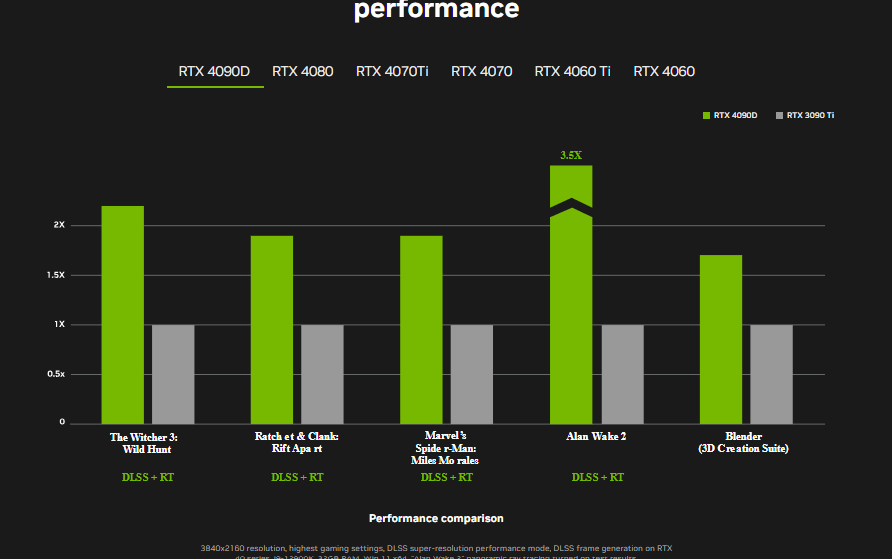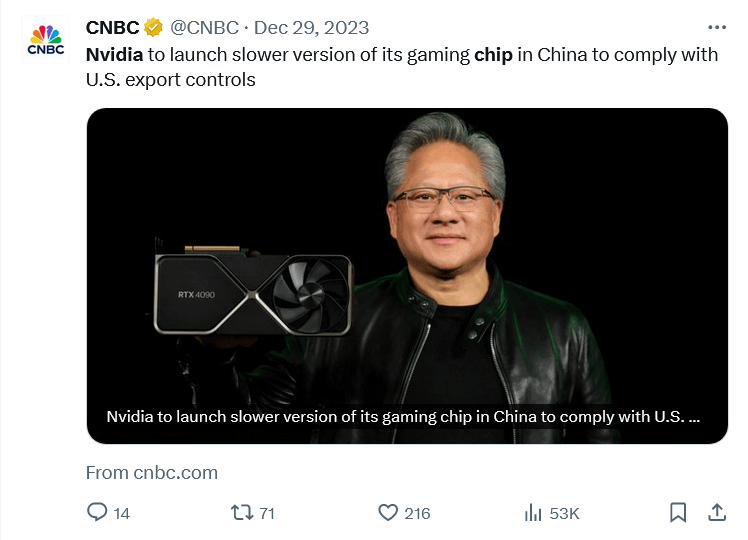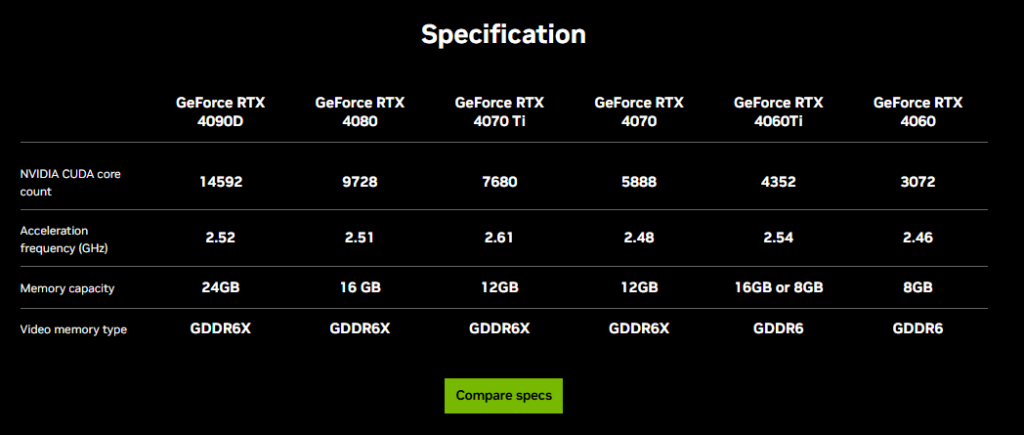
Jensen Huang, co-founder and chief executive officer (CEO) of Nvidia. (Photo by Mohd RASFAN / AFP)
Nvidia unveils China-compliant gaming chip amid US export controls
- Nvidia debuts a gaming chip with reduced speed in China to align with US restrictions on specific technology sales to the country.
- The GeForce RTX 4090D Series GPU features 11% fewer processing cores compared to its counterparts sold outside China.
- What next from Washington?
In the closing chapters of 2023, Nvidia Corp, the current juggernaut of AI chips, pulled back the curtain on its ambitious venture into tailored innovation for the Chinese market. Navigating a complex terrain, Nvidia faced the formidable task of crafting chips that catered to the distinctive needs of its Chinese clientele and danced within the strict confines of Washington’s export restrictions. In December, 2023, the company unveiled a reimagined gaming chip designed expressly for the gaming landscape in China.
Boasting a “quantum leap in performance, efficiency, and AI-driven graphics,” according to the company, the chip is set to hit Chinese shelves in January, 2024, as confirmed by an Nvidia spokesperson to Reuters. “The GeForce RTX 4090 D has been designed to comply fully with US government export controls,” the spokesperson said.

Performance comparison, including the company’s new chip. Source: Nvidia.
Under the new US export control regulations, Nvidia cannot ship its flagship consumer gaming graphic card, the RTX 4090, to China, the world’s largest semiconductor market, making the RTX 4090 D a notable release. The debut of the GeForce RTX 4090 D signifies Nvidia’s first official launch of a China-focused chip since the Biden Administration’s introduction of export rules in October, 2023.

Will Nvidia’s new chip cause issues in Washington?
The Nvidia GTX 4090 D chip listed on the company’s China website packs approximately 10% fewer processing cores compared to its international counterpart, the 4090, sold in other countries. During Nvidia’s CEO Jensen Huang’s visit to Malaysia last month, he affirmed the company’s commitment to crafting compliant versions of its top-tier products, tailored for the Chinese market.
Huang said his company is “extensively engaging” with the US government while developing graphics products that align with the export regulations imposed by the Biden administration, aiming to curb the rapid progress of China’s AI capabilities. The rules also resulted in the blockage of two modified AI chips, the A800 and H800, designed by Nvidia for the Chinese market to comply with the initial export rules unveiled in October 2022.
On December 11, last year, US Commerce Secretary Raimondo, in an interview with Reuters, clarified that Nvidia has the green light to sell AI chips to China, except those boasting the highest processing power. In contrast to the prohibited RTX 4090, the China-centric RTX 4090 D is reported to be “5% slower in gaming and creating.”

Nvidia RTX 4090D specifications.
Priced at 12,999 yuan (US$1,842), the China-targeted RTX 4090 D commands a premium of 350 yuan (US$50) compared to the second most advanced chip in the product series available to Chinese customers.
Is Nvidia working on any more AI chips for China?
In early November, the semiconductor industry newsletter, SemiAnalysis, suggested that Nvidia, in reaction to the recalibrated export rules unveiled in October 2023, might unveil three new AI chips designed for the Chinese market. Nevertheless, as per Reuters‘ report, Nvidia informed its Chinese customers of a delay in launching one of the chips, pushing the release to the first quarter of this year.
Nvidia’s GeForce RTX 4090 D could be the first of the three new AI chips to very distinctly not flout US trade restrictions, and yet allow China to develop its AI programs. As of now, the other two chips have yet to appear on Nvidia’s China website. According to Dylan Patel, chief analyst at SemiAnalysis, one of the China-specific GPUs is over 20% faster than the H100 in LLM inference and is more similar to the new GPU that Nvidia is launching early this year than it is to the H100.
Specification details on Nvidia’s new GPUs show that the AI chip giant is “perfectly straddling the line on peak performance and performance density with these new chips to get them through the new US regulations,” he added.
READ MORE
- 3 Steps to Successfully Automate Copilot for Microsoft 365 Implementation
- Trustworthy AI – the Promise of Enterprise-Friendly Generative Machine Learning with Dell and NVIDIA
- Strategies for Democratizing GenAI
- The criticality of endpoint management in cybersecurity and operations
- Ethical AI: The renewed importance of safeguarding data and customer privacy in Generative AI applications




